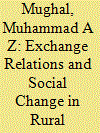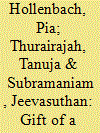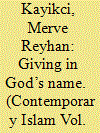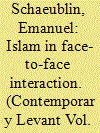|
|
|
Sort Order |
|
|
|
Items / Page
|
|
|
|
|
|
|
| Srl | Item |
| 1 |
ID:
159756


|
|
|
|
|
| Summary/Abstract |
In recent decades, the nature of exchange relations in rural Pakistan appears to have undergone significant transformations due to the gradual shift from seasonal agriculture to a market-based economy, rapid urbanisation and industrialisation. Change and continuity in exchange relations are particularly manifested in rituals and ceremonies associated with childbirth, marriage and death, with socioeconomic transformations in the rural economy triggering shifts in ways of conducting such rituals and ceremonies. This article seeks to highlight such change but argues that the continuing centrality of religion, kinship and economic inter-dependencies, marked by rural social organisation, remains evident in how these rituals and ceremonies are conducted. After discussing the social meanings of such rituals and ceremonies in rural Pakistan, the article demonstrates through detailed ethnographic study certain modifications in exchange relations as a consequence of recent socioeconomic change.
|
|
|
|
|
|
|
|
|
|
|
|
|
|
|
|
| 2 |
ID:
180263


|
|
|
|
|
| Summary/Abstract |
Jaffna District, Sri Lanka, has faced enormous socio-economic difficulties since the civil war ended in May 2009. But in contrast to the visible and apparent infrastructural destruction that characterises much of the District, there is a striking number of newly built Hindu temples. The majority of these new temple constructions are linked to diasporic engagement, philanthropy and giving. Through a Maussian lens, this article provides insights into how the gift of a temple enables people in the diaspora to give something back to local socio-cultural structures, in order to reposition them in relation to their places of origin. However, the Maussian ‘gift’ not only serves the giver; it also impacts on the receiver. The article therefore asks: How does the receiver use these temples? What impact do the temples have on the socio-economic and cultural environment? How are they commodified? Three in-depth case studies will help to provide answers to these questions and to better understand the long-term impact of the gift of temples in post-war Jaffna.
|
|
|
|
|
|
|
|
|
|
|
|
|
|
|
|
| 3 |
ID:
148234


|
|
|
|
|
| Summary/Abstract |
In this article, I look into a case study of a kermes (kermis) to see how Islamic discourses can structure and re-structure an apparently mundane practice. The aim is to see how a mundane activity is transformed into an act of piety, simply because it is driven by a religious intention. Additionally, we study how this intention supported by the articulation of a particular interpretation of an Islamic tradition. Ultimately, the goal is to understand how the kermes is converted into a disciplined practice of moral construction, ethical conduct and allows for the fulfillment of religious and non-religious responsibility and, consequently, how a moral discourse can embed a completely mundane practice and transform it into an ethical cycle of self-development, sacred duty and gift giving. This study fills a gap in the literature on volunteering as it examines how practices of volunteering are developed according to a discourse of piety and are the result of a process of active decision-making, according to the context in which the volunteers live. The data for this research was gathered through participant observation and dialogue.
|
|
|
|
|
|
|
|
|
|
|
|
|
|
|
|
| 4 |
ID:
169283


|
|
|
|
|
| Summary/Abstract |
Zakat is the Islamic obligation to give away a share of one’s moveable wealth for the sake of the community—primarily supporting people in need. Based on fieldwork in the Palestinian city of Nablus (2013–2014) where institutional channels for distributing zakat had become blocked due to security crackdowns in 2008, this article analyses direct zakat practices where givers and receivers confront one another in face-to-face interaction. In Nablus, openly displayed material want was assumed to ‘expose’ people living in poor households as well as their relatives and neighbours. Against this background, direct zakat manifested itself as discreet gestures of ‘covering’ need, while people not asking openly for support tended to be praised for their shyness and piety. In direct zakat transfers, people actively cared for how they appeared to one another in social interactions. This ‘ethical work’ of presenting oneself involved reading signs, embodying Muslim virtues and invoking God as the sole source of material provision. Considering the Islamic tradition’s presence within social interactions, this article seeks to understand how Muslim piety exceeds the individual and how the moral responsibility to cover the needs of others is socially distributed.
|
|
|
|
|
|
|
|
|
|
|
|
|
|
|
|
|
|
|
|
|